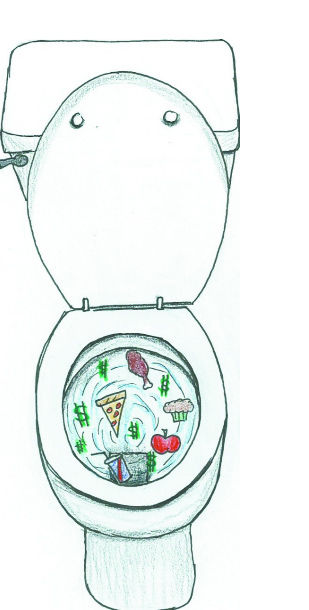Editorial: Don’t let meal plans go to waste
Whether you simply forget to use the meals or choose not to brave the cold to make it to a dining hall, it is important to remember that when you don’t maximize your use of a meal plan you are flushing money down the toilet.
November 17, 2014
As the semester begins to wind down and finals approach along with the ever-worsening weather, students will find that they have more and more on their plates. However, it is the food that might not be on their plates that often slips the minds of students who use university meal plans.
Whether you simply forget to use the meals or choose not to brave the cold to make it to a dining hall, it is important to remember that when you don’t maximize your use of a meal plan you are quite literally leaving money on the table.
If you invested in a meal plan at the beginning of this semester, you put thousands of dollars into an account that, if not emptied, will disappear straight into the pockets of ISU Dining, and according to the ISU Dining website, there are 20 serving days remaining for the semester, as of Nov. 16, before all remaining meals vanish on Dec. 19.
The website keeps a running count of how many meals students should have remaining for each available meal plan. The highest amount of meals that a student should have in order to most effectively use the most expensive meal plan is currently at 53. This means that any student with remaining meals in excess of 53 is currently at risk of coming up short on meal use.
Each meal plan’s initial cost reflects a different monetary value for each individual meal. If a student purchased the Gold plan — the third most expensive of the five available plans and the “default” meal plan for ISU Dining — then each meal is valued at $7.28. Therefore, if a student allows only 15 of their meals to expire prior to the end of the semester, they are losing $109.20. In the relative scheme of the cost of college living, 100 dollars may seem negligible, but the fact is that this is intolerably wasteful spending.
Students will often have excess meals because they expend their allotted “dining dollars”— which in many cases operate in the same way as meals, but offer increased purchasing flexibility — at a faster rate than their meals, finding at the end of the semester that they have no remaining dining dollars, but plenty of meals. Such use of the meal plan is backwards and ineffectual because dining dollars are transferable across semesters — fall to spring only, they do not carry into a different academic year unlike meals, which expire each semester, as previously noted.
Therefore, the most logical use of a meal plan would be to expend all available meals before dipping extensively into the dining dollar account.
In an attempt not to let the meals go to waste, in many cases students will share their meals with their friends who may have used all of their own or never had a meal plan to begin with. While this seems as though it would only hurt the owner of the meal plan, ISU Dining imposes a five meal limit for guest passes at the university dining halls. Such a policy exemplifies excessive and unnecessary control over meal use.
The students or their parents pay for the meal plan, so why should ISU Dining have a say in how many of those meals are shared or who they are used by? ISU Dining does not make money as a student uses each individual meal but instead at the beginning of the semester when the meal is initially purchased. The university already made its money, so they should lessen any further attempts to regulate meal use.
Shifting back to the responsibility of students to keep track of and use their meals effectively, if you find that you will inevitably have excess meals remaining at the end of this semester, consider revising your selected meal plan for next semester so that you don’t face the same problem again. Remember that it’s your money, so don’t take these meals for granted.

















